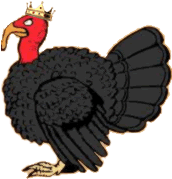
Last night I discovered the Spanish word pavo real, which means peacock, or literally ‘royal turkey’, and which conjured up an image of a turkey in ermine robes wearing a crown.
It also reminds me of the Mandarin Chinese word for swan, 天鵝 [天鹅] (tiān’é), which could be translated as ‘heavenly/celestial goose’. The Mandarin word for peacock is 孔雀 (kǒngquè) or ‘great sparrow’. [source]
The word pavo comes from the Latin pāvō (peacock), from the Ancient Greek ταώς (taōs), and thought to be ultimately from Tamil தோகை (tōkai).
The words for peacock in many European languages come from the same root: Aromanian: pãun; Breton: paun; Catalan: paó; Cornish: payon; Dutch: pauw; French: paon; Friulian: pavon; Galician: pavo, pavón; German: Pfau; Italian: pavone; Occitan: pavon; Old English: pāwa; Portuguese: pavão; Romanian: păun; Romansch: pavun, pivun; Sardinian: paboni, paone; Serbian: paun; Welsh: paun [source]. However in Manx a peacock is a kellagh aalin (‘beautiful cock(rel)’) or a kellagh eairkagh (‘peaked cock(rel)’) [source].
Are there interesting words for peacocks, or other birds, in other languages?
The word pavo has quite a few other meanings in Spanish, including:
– silly thing, idiot; five peseta coin; sucker (in Spain)
– stowaway (in Chile)
– large kite; big shot; evil-looking person (in the Andes)
– youngster, kid
– cold turkey
– silly – e.g. ¡no seas pavo! = don’t be silly!
From: Reverso

